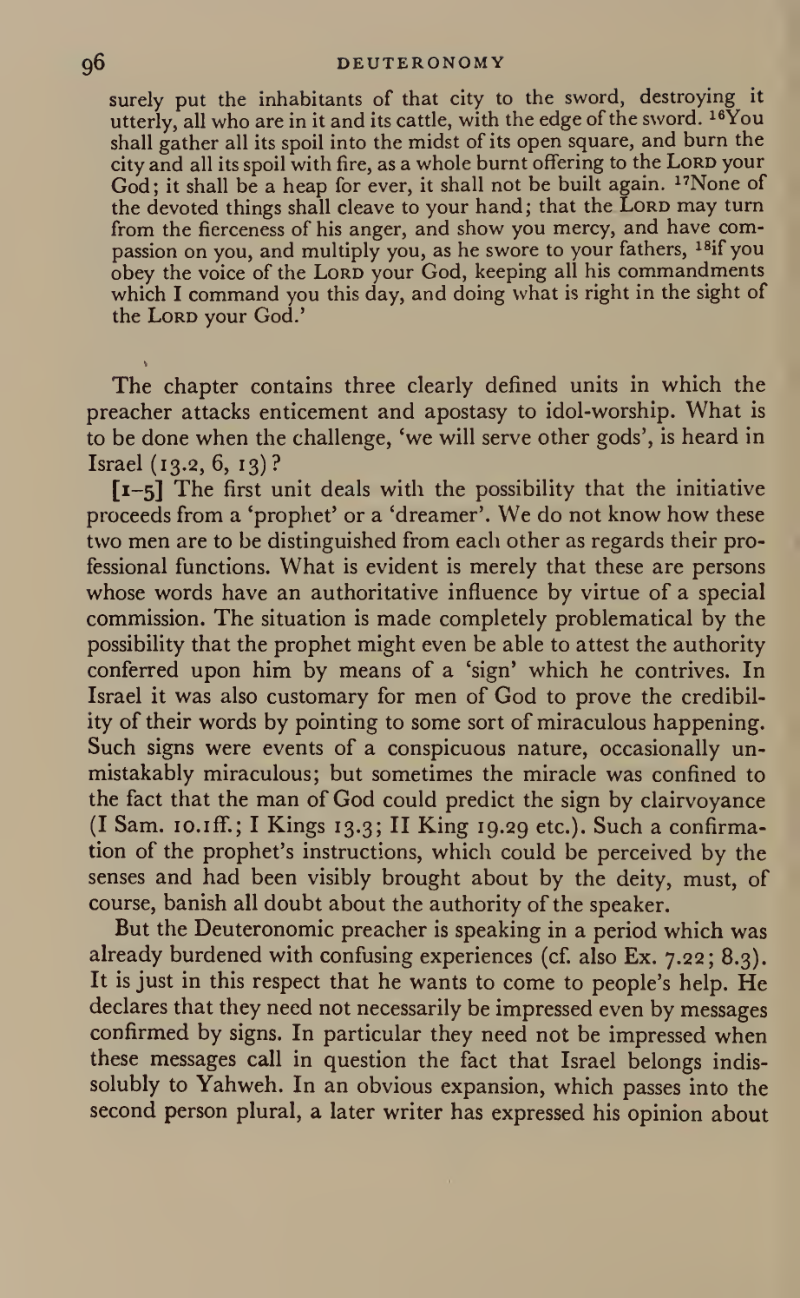Gerhard Von Rad provides an exegesis of Deuteronomy 13 and the test of a prophet.
- Type
- Book
- Source
- Gerhard Von Rad Non-LDS
- Hearsay
- Direct
- Reference
Gerhard Von Rad, Deuteronomy: A Commentary (The Old Testament Library; Philadelphia: The Westminster Press, 1966), 96-97
- Scribe/Publisher
- The Westminster Press
- People
- Gerhard Von Rad
- Audience
- Reading Public
- Transcription
The chapter contains three clearly defined units in which the preacher attacks enticement and apostasy to idol-worship. What is to be done when the challenge, ‘we will serve other gods’, is heard in Israel (13.2, 6, 13)?
[1-5] The first unit deals with the possibility that the initiative proceeds from a ‘prophet’ or a ‘dreamer’. We do not know how these two men are to be distinguished from each other as regards their professional functions. What is evident is merely that these are persons whose words have an authoritative influence by virtue of a special commission. The situation is made completely problematical by the possibility that the prophet might even be able to attest the authority conferred upon him by means of a ‘sign’ which he contrives. In Israel it was also customary for men of God to prove the credibility of their words by pointing to some sort of miraculous happening. Such signs were events of a conspicuous nature, occasionally un¬ mistakably miraculous; but sometimes the miracle was confined to the fact that the man of God could predict the sign by clairvoyance (I Sam. 10.iff.; I Kings 13.3; II King 19.29 etc.). Such a confirmation of the prophet’s instructions, which could be perceived by the senses and had been visibly brought about by the deity, must, of course, banish all doubt about the authority of the speaker.
But the Deuteronomic preacher is speaking in a period which was already burdened with confusing experiences (cf. also Ex. 7.22; 8.3). It is just in this respect that he wants to come to people’s help. He declares that they need not necessarily be impressed even by messages confirmed by signs. In particular they need not be impressed when these messages call in question the fact that Israel belongs indissolubly to Yahweh. In an obvious expansion, which passes into the second person plural, a later writer has expressed his opinion about the natural question as to how such signs should be judged. Did they come from Yahweh at all ? Yes, they did; for behind such phenomena, too, there stands Yahweh, that is to say, he is using a deliberate divine method of teaching. In ways like this he devises a test of Israel’s loyalty. (Micaiah ben Imlah gave a quite different interpretation of the counsel of false prophets, namely, that it was a means to delude Israel, and to bring the nation under judgment [I Kings 22.22f.]). The interesting point here is that faith in the fact that Israel belongs to Yahweh is set above all else; not even a sign coming from the divine world is able to shake this assurance. It is not easy to say what kind of prophets the preacher in Deuteronomy has in mind. Did Canaanite prophets (I Kings 18.19) Pass over *n this way to the offensive against the faith of Yahweh? Samaria had no sanctuary of Yahweh, but a temple of Baal (II Kings 10.23). Here such an awakening of Canaanite self-assurance might no doubt be imagined. Or is it a question of conditions in the former Northern Kingdom in the period after 722, when the faith of Yahweh found itself driven back on the defensive in what was now an Assyrian province?
[6-11] The second section starts by assuming that the summons to apostasy was heard in the inner circle of the family. What is interesting about this is the way in which here the faith of Yahweh, which in the early days had been just a matter of the public cult and particularly of the men assembled by levy, has now brought its tensions into the sphere of the family. It is here a matter for personal decision— even for the women—and must stand the test in the face of quite personal temptations. It is such an important matter that in certain circumstances it might break up the unity of the family.
- Citations in Mormonr Qnas
The B. H. Roberts Foundation is not owned by, operated by, or affiliated with the Church of Jesus Christ of Latter-day Saints.

